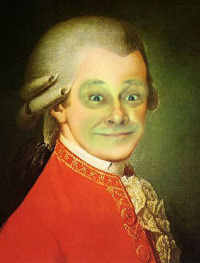A 365-Day Project
"We Are All Mozart"
A project to create
new works and change
the perception of the
music of our time.


 July 17, 2006
July 17, 2006 
The brilliant yellow day lilies bloomed today, which is welcome because it's Monday, it's hot and humid (excessively for Vermont), and I have to put my attention to some RFID writing projects instead of composition. So there are some lingering thoughts to set down ... and then it's on to reporting about live monitoring of medical equipment movement in hospital settings.
We Are All Maddened
There's a kind of topical schizophrenia in that last paragraph, isn't there? Composers are very strange individuals, moving from modern rationalist business or service mentality to an ethos of the sonic spirits. Aside from the number of composers who survive in musical academia, there are among my composer acquaintances a goodly handful of professional performers (my fingers had first typed "progressional" performers; what did that mean?), private performance instructors, conductors and impresarios (who earn a living at it, that is), a research assistant, a carpenter, quite a number of programmers, a few writers & editors & publishers, a pair of trust fund babies, a day laborer, various commercial artists, sundry audio engineers, teachers and professors in non-musical topics, an actor, a librarian, a record label executive, a factory worker, a headmaster, a display designer, many who cobble together numerous part-time occupations into economic sustenance (that would be me -- tech writer, book editor, ghostwriter, audio restorer, engraver, photographer...), and dozens who never speak of their 'day jobs' at all.
The advantages may be a broadness of thinking informed by experience exercizing the mind differently. In modern times, what would it be like to be a successful full-time composer almost from the outset? Even Philip Glass drove a cab after his initial fame. (I wonder what his conversation was like behind the steering wheel in Manhattan? Was he nuts, too?) The disadvantages of a fragmented work life may be a pulling away from ideas that are threading themselves out, and an unwitting abandonment of multiple expressive meanings in favor of a simpler path.
We might integrate the musical development into our other work, but most often we cradle these sonic ideas separately, nurturing them intermittently, and so they grow uncertainly and we worry about their vigor and maturity. Or, putting art aside, we adopt a mantle of arrogance and become certain that these children, despite shortcomings and blemishes, are obviously being misjudged by outsiders. And the compositions themselves resist us and try our patience. They are unruly or opaque -- or simply die before our eyes.
This is either unhealthy and damaging or challenging and mind-expanding. In either case, we become, under the surface of our demeanor, wild-eyed madpeople wrestling with ourselves.
We Are All Mutterers
Composer Noah Creshevsky wrote to me about Saturday's commentary. He quotes my words, "the quest has been for voice without implication or symbolism, devoid of verbal syntax -- for the grail of a meaning-free glossolalia" and remarks that "the mind creates and connects its own second dot, even when only one dot is given. In other words, a single syllable is enough to imply something, and that is always the case, if not for you and me, then for someone else. It suggests something to someone."
I agree with him. No composer has found that grail of word-without-meaning, nor will composers be able to create implication-free verbal sounds. In the attempt to divest vocal expression of meaning, though, new ways of incorporating the voice in music can arise. Sound-voice and the word-voice are melded, and it's enormously revealing to continue exploring that relationship -- even moreso as 'artificial' voices enter our vocabulary. What we thought laughably crude with Daisy and accepted as fiction with the famous "Hello, Dave" has come into being -- right on Arthur C. Clarke's schedule.
And so as composers, we continue to explore how the voice can be symbolically de-toxified of symbol while artificial intelligence researchers seek to imbue the sounds of silicon technology with humanity. Interesting times.
We Are All Mozart
The quarter-millenium hyperbole over Mozart has pushed his image over the edge. A defensiveness has crept into the celebrations, too. So it was inevitable that my choice of We Are All Mozart for the project name would be met with equivocation.
Composer and thespian Robert Bonotto considered the project title somewhat wrongly thought through. He wrote, "Being a non-Mozartean myself, I would've called it 'We Are All Haydn,' for the reason that he was fully of productive as Mozart, but also said that he was out in the boonies and had to 'invent himself.' Well. Despite the fact that we are, in effect, surrounded by downloadable music-data, we are isolated (perhaps by ourselves) from the involvement of others on what is something you really do by yourself. Haydn's output really was prodigious, and he was as much inventor/integrator as composer -- which is something we all are, now."
He continues, "We're not 'inventing,' of course. But Haydn's inventions largely involved taking the gutsier elements of non-classical and finding ways to fit them into new molds that, the moment they fit, seem traditional." Robert expands on the idea that on "soft-core classical stations" Haydn has become "fellow-traveler" to Mozart.
It's a fair point, albeit changing "WAAM" to "WAAH" -- however appropriate -- isn't possible at this late date.
The focus on Mozart has caused a disquiet, almost a public unraveling of the classical icon. And reactionary pianist András Schiff won't have it. As a guy firmly rooted in the past, Schiff is an authority without authority. We all love our specialties. But one might have expected a reasoned argument, whereas Schiff treats us to the usual pathetic name-dropping ("Mozart's greatest admirers included Haydn, Goethe, Kierkegaard, Mendelssohn, Chopin, Nietzsche, Debussy, and Britten") -- not exactly a pantheon of particular interest to this contemporary nonpop composer. And vis-à-vis a public critic of the Golden Pleuritic, Schiff gives away his Napoleanic impulses when he parenthetically asks, "(Forgive my ignorance, but who is Armando Iannucci?)"
But Schiff goes on with an extraordinary performer babble, without a fact in sight. An incomprehensibly useless essay, it seeks in small compositions to find shreds of imagination and heralds of the future. For all his writing illuminates, he might has well have signed his name to an essay reading "I like Mozart. He is cool." Instead he asks rhetorically, "Mozart is a gift to mankind, but do we deserve this gift?" Talk about a guy who brooks no argument.
Even Bill Tucker, earnest CNN reporter and classical music enthusiast, wrote to me, "ever the optimist forcing me to point out the very obvious: we are not all Mozart!" And again, a fair point if a bit of hyperbole isn't your game as it is mine.
I've not made my case with respect to Mozart very strongly because my concept is not to Mozart-bash, but to make clear that, though he was a historical prodigy, the simplicity of his music is not sublime, but merely and happily simple -- which is why (as Schiff quotes Schnabel), it is "too easy for children, too difficult for adults." Adults have to bring something additional to it that is not there upon the page, and its simplicity allows them to interpose myriad interpretations and insinuate them into Mozart's quill. Children don't have that need, but adult performers -- especially specialists like Schiff -- are on a quest for yet another imaginary grail.
We do not credit children with great novels, great paintings, great sculpture, great dance, great architecture. But somehow we are willing to abjure those standards for Mozart -- and that is nonsense. Beautiful 18th Century music is not the alpha and omega.

The yellow day lilies bloomed for the first time this morning. They seem not to know that it's Monday.